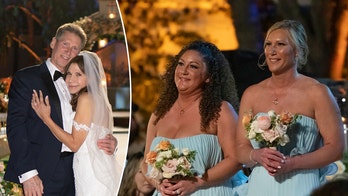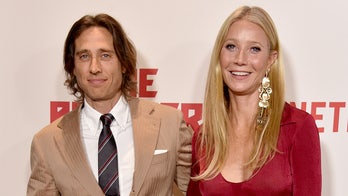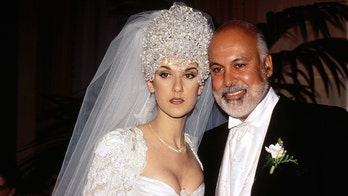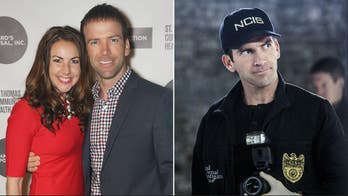LOS ANGELES – Fourteen-year-old “Modern Family” star Ariel Winter is the latest child star to seek legal emancipation from a parent amid allegations of emotional abuse. But becoming an “adult”– complete with adult responsibilities such as entering into legally binding contracts, taking out credit cards and making healthcare decisions – when as young as 14, isn’t exactly easy.
Melissa Francis, a child star on the classic “Little House on the Prairie,” and now a journalist for the Fox Business Network, knows first-hand the painful process of heading to the court to seek emancipation. “My mom had a power over me, over all of us, for a long time. I was hostage to her moods, her violence, her praise, her favor, all doled out in random doses and with confusing inconsistency, which had been designed to control me, training me to crave her attention like a starving dog,” Francis told FOX411’s Pop Tarts column. “I became a master of managing my mother’s moods. I would save pieces of good news, a good grade, a bit of gossip, to distract her when the tension was building. It was exhausting and ultimately made me so resentful.”
Francis, who is releasing a tell-all memoir “Diary of a Stage Mother’s Daughter,” went on to become an emancipated minor at age 15, and says the overnight transition from teen to adult was far from lovely and liberating.
“I didn’t have a driver’s license, how would I get to school? I wasn’t organized enough at 15 to pay the rent, manage my schedule, go on auditions, work and take care of my basic needs. It didn’t seem possible to break free,” she said. “But I realized if I was going to seize the reins from my controlling stage mother, I had to be able to take charge of my life.”
Francis, who continued acting regularly after "Little House" before becoming a financial news reporter, was one of the fortunate ones whose emancipation experience eventually worked out for the better. For other child stars, the road has been rougher.
Despite starring in several big screen hits, including “Stand By Me” Corey Feldman discovered he had just $40,000 in savings and in 1987, at age 15, won emancipation. Left to his own devices, Feldman married at 17 – divorced a few years later – and embarked on a dangerous drug habit which culminated in a 1990 arrest for possession.
Just two months after Hollywood newcomer Edward Furlong’s blockbuster “Terminator 2” opened, a custody battle developed between his aunt and uncle, who had been living with, and his mother. His aunt and uncle gained legal guardianship in 1991, and in 1993 his mother regained parental rights, but that same year – at age 16 – Furlong officially became legally emancipated. Furlong’s life since has featured substance abuse, legal problems, and a restraining order by his ex-wife Rachael Bella. In 2010, the actor was arrested and jailed for violating his probation. Last year, he told a judge that he was “completely broke” and unable to pay child support.
In the late 90s, one of the most successful child actors of all time, Macaulay Culkin, entered into a bitter dispute with his parents to gain control of his earnings and became legally emancipated at age of 14. The “Home Alone” sensation married actress Rachel Miner at 17, but separated two years later. In 2004, Culkin was arrested in Oklahoma City for the possession of 17.3 grams of marijuana and two controlled substances, Alprazolam and Clonazepam, for which he was briefly jailed. Just a few months ago, photographs emerged of the actor looking emaciated and worse for wear prompting headlines that he was addicted to heroin and possibly even dying, although this was shot down by his representative.
There are other success stories involving emancipated Hollywood minors like Michelle Williams, Alicia Silvertone, Eliza Dushku, and Drew Barrymore. But not everyone who asks for a divorce from his or her parents is granted one. 80’s pop star Tiffany sought emancipation in 1988 when she was 16 years old, after her first breakout album, citing reasons that her mom was suppressing her career. However, the courts denied her request.
Ariel Winter’s request has yet to be ruled on, as her mother Chrisoula Workman has filed an Objection to Petition for Appointment of Guardian of Minor. Workman denies all allegations of abuse and sexualization of her daughter, and alleges that she caught her daughter in bed with her 18-year-old boyfriend, and suggests that Winter only wants emancipation so she can free to continue sexual relations without parental consequences.
According to BizParentz Foundation, a non-profit organization which endeavors to support families of children working in the entertainment industry, emancipation for a teen actor should ultimately be considered “a last resort” – a solution for things gone bad, and not a means to gain a competitive edge, such as being legally allowed to work extended hours.
David Gurwin, an entertainment attorney at Buchanan, Ingersoll & Rooney, noted that “unscrupulous managers will sometimes pressure a minor to seek emancipation if the minor's parents won't agree to sign the management agreement so that the minor will then have contractual capacity to sign,” and celebrity attorney Lubov Stark said that in most cases, the young star seeks emancipation “to protect the assets they have acquired, are trying to escape an unstable home life that is interfering with their career or they are seeking to avoid child labor laws which prevent them from working long hours.”
“The decision to emancipate a child is very serious because it legally declares the minor an adult for purposes of decision making. Once emancipated, the minor is able to enter into contracts and is responsible for his/her own support, thus the decision to emancipate is never taken lightly,” Stark remarked. “In my opinion it is much harder for parents to overstep their boundaries in this day and age because children are much more savvy, having all the answers one Google click away."






